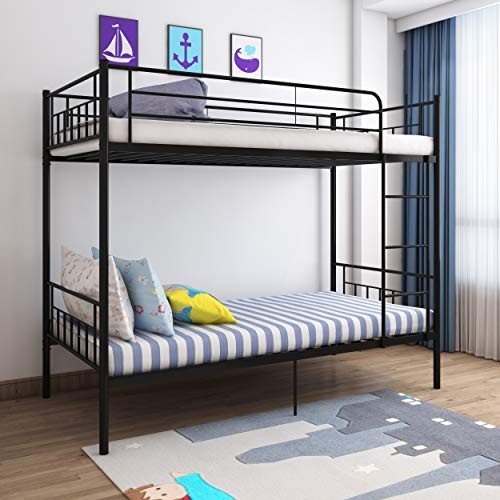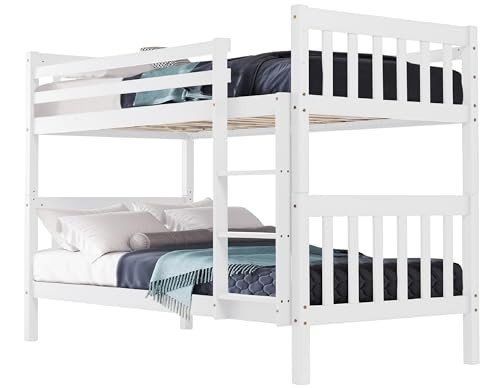
Bunk Beds Sales
Add a review FollowOverview
-
Founded Date August 14, 1934
-
Sectors Sales / Marketing
-
Posted Jobs 0
-
Viewed 24
Company Description
Guide To Bunk Beds: The Intermediate Guide The Steps To Bunk Beds
Exploring Bunk Beds: A Comprehensive Guide
Bunk beds have actually long been a staple in kids’s bed rooms, dorms, and even homes with restricted space. Not just do they supply a useful sleeping solution, however they likewise create an enjoyable and imaginative environment for kids and a great space-saver for adults and households. This post will explore everything you need to understand about bunk bed near me beds (https://www.tressiehetland.Top/), from types and materials to safety tips and buying recommendations.

Table of Contents
- Types of sale bunk bed Beds
- Traditional Bunk Beds
- Loft Beds
- Triple bunk bed near me Beds
- L-Shaped Bunk Beds
- Material Options
- Wood
- Metal
- Security Considerations
- Purchasing Guide
- Frequently asked questions
Types of Bunk Beds
Bunk beds are available in various designs to suit various requirements and preferences. Here’s a breakdown of the most typical types:

Conventional Bunk Beds
Standard bunks typically include two beds stacked vertically on top of one another. These beds are perfect for siblings sharing a room or for maximizing sleeping space in guest rooms.
Loft Beds
Loft beds stand similarly to conventional bunk beds however do not have a lower sleeping area. Rather, they typically incorporate a desk or seating location below, making them a great choice for little rooms requiring multifunctionality.
Triple Bunk Beds
Triple bunk beds are developed for three residents, with beds stacked in a three-tier configuration. These are less typical but can be an enjoyable option for large households or sleepovers.
L-Shaped Bunk Beds
With one bed placed horizontally and the other vertically, L-shaped bunk beds are frequently geared up with extra features such as desks or storage drawers and can match corner areas in a space.
Comparison of Bunk Bed Types
| Bed Type | Suitable Use | Description |
|---|---|---|
| Conventional | Shared bed rooms or guest spaces | 2 beds stacked vertically |
| Loft | Small spaces requiring multi-purpose space | Upper bed with open space below |
| Triple | Large households or slumber parties | 3 beds stacked vertically |
| L-Shaped | Corner or versatile spaces | A mix of vertical and horizontal beds |
Product Options
Bunk beds are produced from different materials, with wood and metal being the most typical. Each product has its pros and cons.
Wood
- Durability: Generally robust and can hold up against years of use.
- Aesthetic Appeal: Offers a traditional appearance that can mix with various designs.
- Weight Capacity: Typically sturdier; can support heavier weights.
- Disadvantages: May be more pricey than metal choices and can be prone to scratches.
Metal
- Durability: Generally lightweight and easy to move however still tough.
- Modern Design: Often comes in smooth styles, making it appealing for contemporary spaces.
- Cost-Effective: Usually less expensive than wood choices.
- Disadvantages: Can be cold to the touch in winter seasons and may not have the very same aesthetic appeal for some purchasers.
Security Considerations
When it concerns cheap bunk beds beds, security can not be ignored. Here are essential security ideas to bear in mind:
- Guardrails: Ensure that the leading bunk has guardrails on both sides to avoid falls.
- Tough Construction: Check for a solid develop and sturdy materials to hold up against weight and movement.
- Weight Limit: Adhere to the producer’s weight limit for both the upper and lower bunks.
- Ladder Design: Choose bunks with a safe, easy-to-climb ladder and prevent any sharp edges or rungs.
- Age Restrictions: Most manufacturers suggest that children under the age of 6 ought to not oversleep the upper bunk.
Purchasing Guide
When searching for bunk beds, think about the following factors to find the very best fit for your needs:
- Space Availability: Measure the space size and ceiling height, guaranteeing there is adequate space for the leading bunk.
- Bed Size: Decide between twin, full, or larger sizes based sale on bunk beds your needs and the size of the space.
- Design Preference: Consider the general decor of the bed room to discover a suitable style.
- Ease of Setup: Look for a bunk bed that is straightforward to put together.
- Budget plan: Bunk beds come in various rate varieties, so determine a spending plan before starting your search.
Frequently asked questions
1. What is the recommended age for kids to sleep on the leading bunk?
Kids aged 6 and older are generally recommended to sleep on the top bunk to decrease the risk of falls.
2. How can I make my bunk bed more secure?
To improve safety, ensure guardrails are effectively installed and examine that the bed is positioned on a flat surface area. Additionally, motivate kids to utilize the ladder carefully.
3. Can I transform a bunk bed into 2 separate beds?
Lots of bunk beds are developed to be convertible. Inspect the manufacturer’s requirements for convertibility functions.
4. What accessories are available for bunk beds?
Typical accessories consist of beddings, storage drawers, staircases rather of ladders, and tented canopies for a fun visual appeal.
5. How do I preserve my bunk bed?
Routine checks for loose screws or structural stability can help guarantee security. Dust the bed routinely and tidy spills without delay to keep the products in good condition.
Bunk beds are flexible and a space-efficient option for different living circumstances, from children’s rooms to guest lodgings. With many styles and materials offered, possible buyers have a wealth of alternatives to think about, ensuring a mix of practicality and aesthetic appeals. By prioritizing security and following the pointers laid out in this guide, people can find the right bunk bed that matches their space and way of life, all while developing a satisfying sleeping environment.

